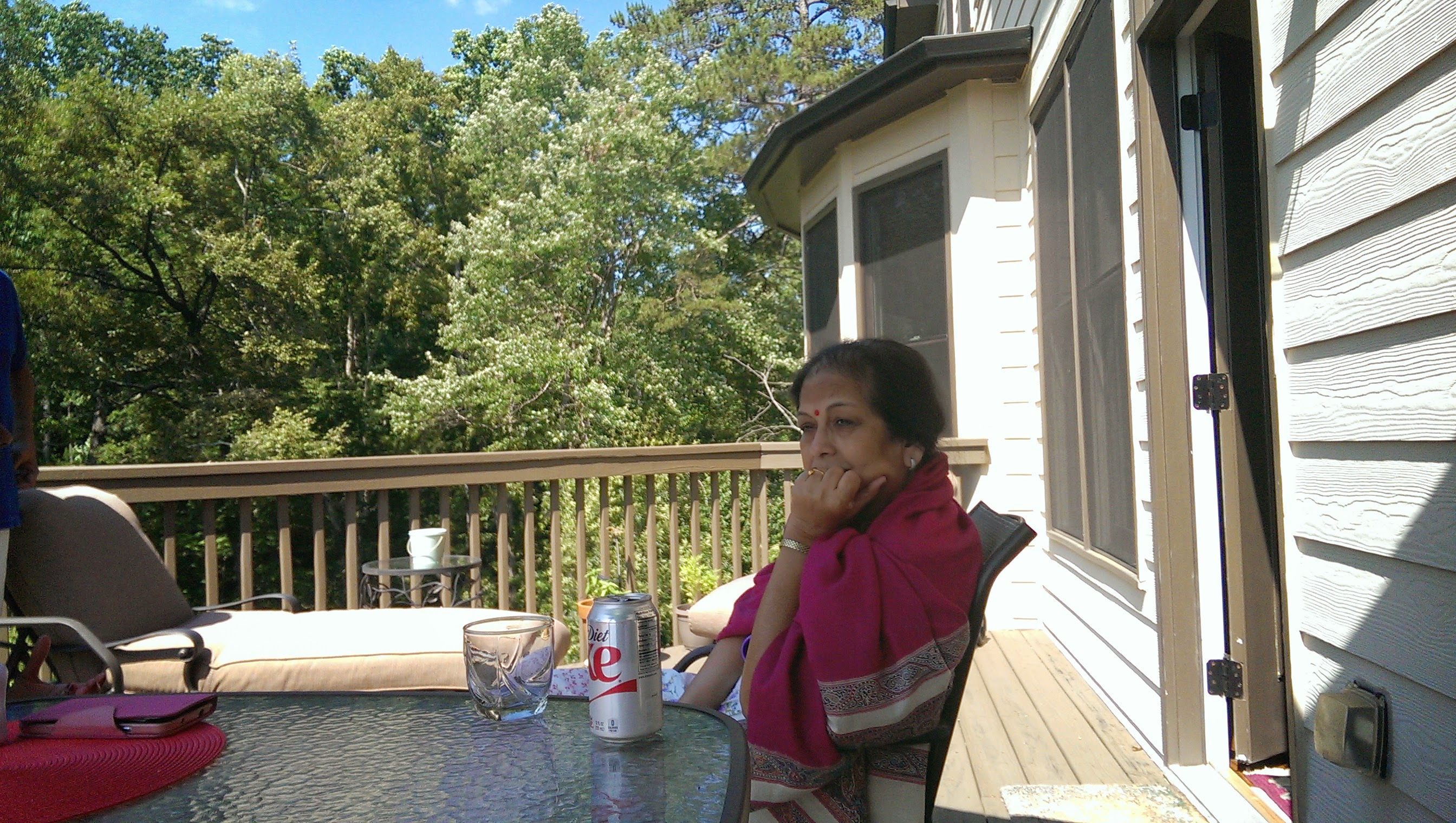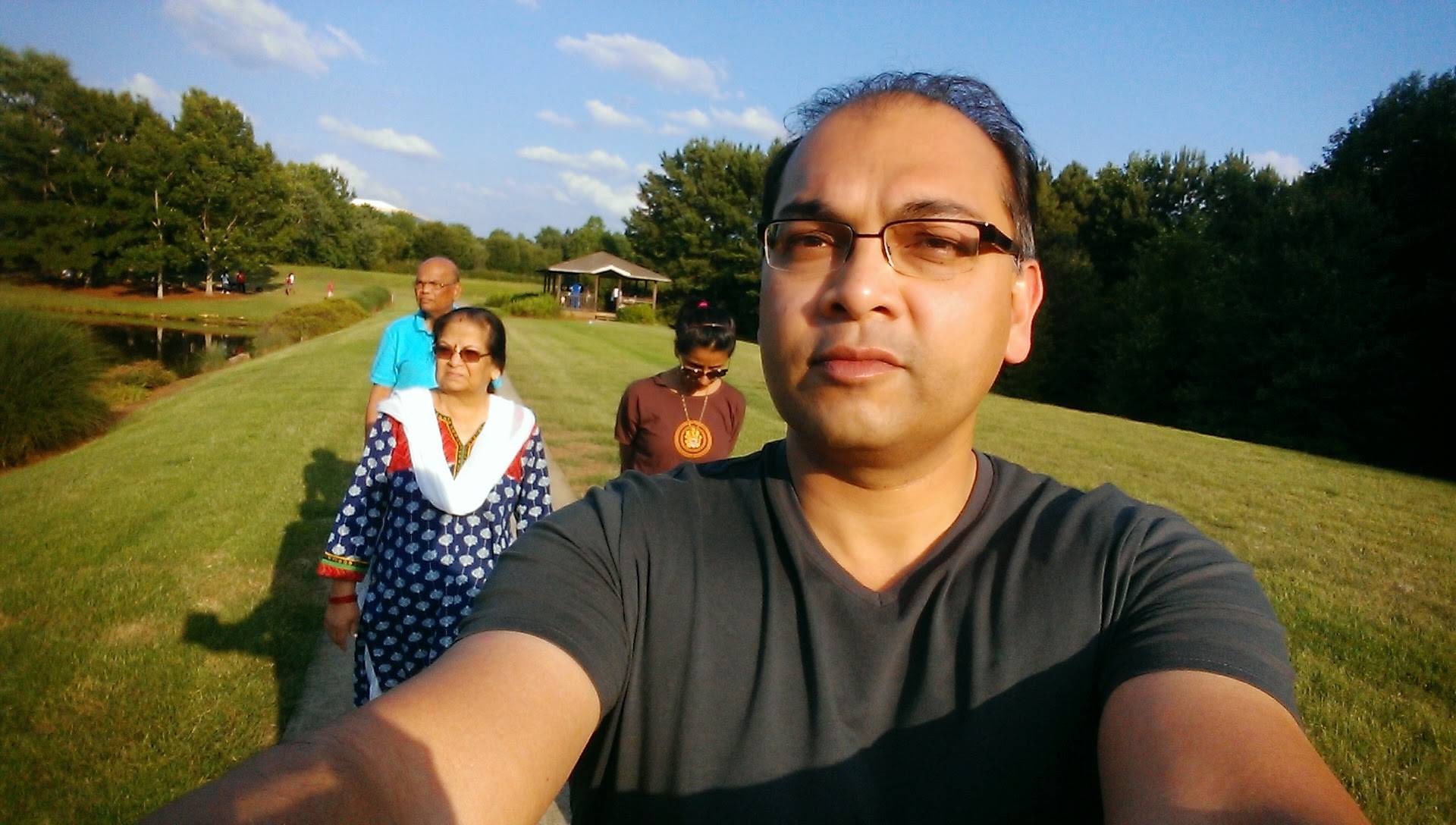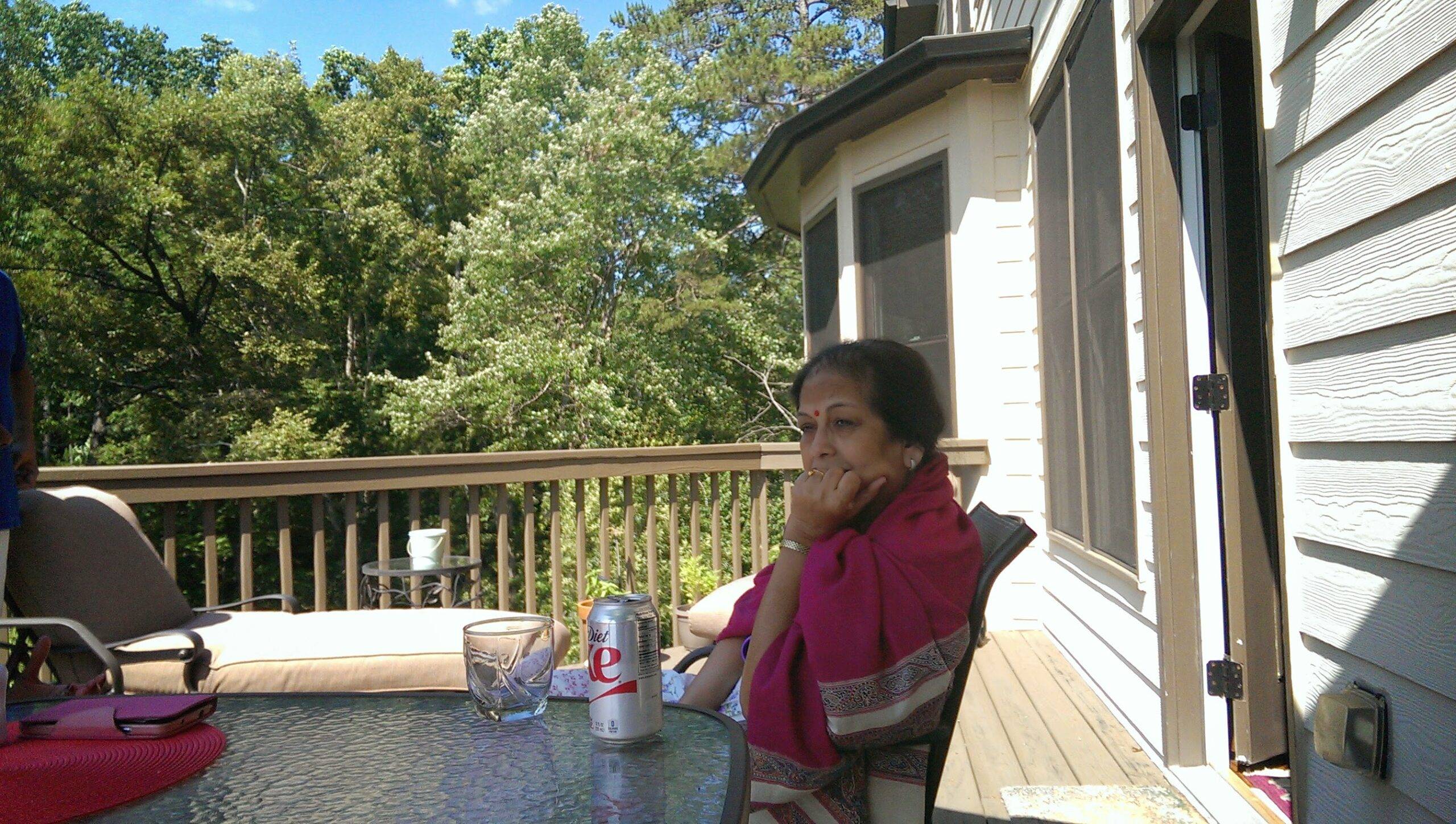A PET (Positron Emission Tomography) scan works on the scientific principle that cancer cells, because they are dividing rapidly, need to use more energy (really, sugar) than normal cells. By injecting a suspected patient with a radioactive solution that is essentially a mix of sugar, radiologists can pick up the degree of absorption of sugar in the patient’s tissues. The more actively a person’s cells are dividing, the more radioactive sugar they use and reflect on the PET scan. The areas that show up with more than normal sugar uptake, which is calibrated to be 1, are suspected cancers.
On 1 July, I took Ma to the radiology center at Gwinnett Medical Center in Lawrenceville. After injecting the radioactive liquid into her, she was asked to wait for 50 minutes. The technician then had her get into the PET scan machine. About 10 minutes later, the scan was complete. I remember watching the technician’s face very intently, hoping that his lack of shock meant Ma had nothing wrong with her.
The next afternoon, on 2 July, we – Ma, Papa, and I – were in Dr. Hagenstad’s office. The doctor came in, went through initial introductions, and got down to business.
I still remember every word, every nuance, and my reaction to it all.
Ma had cancer of the esophagus, he said. It had been around for a while, but it had been true to character in not being very visible until well into its development.
They should be able to cut it out, I remember thinking. It could have been worse. Right?
The cancer had also spread to her lungs, he continued. That didn’t sound good at all.
With the kindest expression on his face, he explained that that meant the cancer was now in Stage 4. It was in her esophagus, lungs, and several lymph nodes. It could not be cured. He then launched into the treatments that were available to her.
I reacted to the pronouncement of a death sentence on my mother by sinking into my chair, feeling as though my body had become both twice as heavy and half as strong. My mother looked more angry than upset. Papa looked very worried. That instant, which probably lasted a few seconds, felt like it had the weight of eternity.
I asked the doctor if we could do anything. As he went through treatment options, I kept looking at my mother, and felt an enormous sadness overcome me at the certainty that she was so definitely beginning her last days right there, as we sat and listened.
Dr. Hagenstad told us that she could have chemotherapy, radiation therapy, or no therapy at all. Any therapy she did have was going to be palliative, which meant that it was going to be targeted at delaying her inevitable death. We asked him for his opinion on what the best course of treatment was. His answer was rather brutal, although I don’t believe he meant it to be. He told us that, in his opinion, Ma should start putting her affairs in order, meeting her loved ones, and undertaking any travel she wanted to while she was still able to – because she wasn’t going to be able to do much in a few months.
We agreed that we’d come back to start treatment soon, and walked out. Under usual circumstances, Ma always tended to walk a few steps behind us, both because she was culturally conditioned to, and because she was a slow walker. Her walk that day was different. She strode out with purpose, almost in anger, while we followed in shock.
No one spoke on the journey back. Ma and Papa got out of my car when we got home, and went in. As I parked in my garage, I made the first of the many calls I would have to make. When Dabloo, my brother, picked up, I told him what had happened, and both of us simply stayed silent on the phone, shaken at the enormity of what was happening. He said he would start for my house right away.
They tell you that everybody has to go one day. Death is the only thing that is certain in our lives, you have heard. Philosophy, religion, logic – they all have their version of this absolute truth. Let me tell you, when you are confronted by this stark reality about someone whom you love with all your heart, someone you want to protect – someone you should be able to protect because she is a defenseless, 5 foot 3 inch, 64 year old woman who has done nothing but try to give you the best of everything all your life, and you are a 6 foot tall, big, sturdy man with broad shoulders who intimidates most people – and you realize you can do nothing, really, it breaks your heart.
Once Dabloo arrived, he held Ma and cried. Papa was tearful as well. In a sign of things to come, Ma was the one telling us everything was going to be all right. Three grown men, all attached to her in ways that cannot be quantified, were crying their eyes out, and again, she was the one comforting us!
Months later, I would ask her about how she was taking it all, and she would tell me she was always absolutely certain that the cancer was going to be cured. She had stared death in the face before, back in the mid-1970s, when doctors had operated on her to remove part of a kidney. This was the first surgery of its kind in Bokaro General Hospital. Bokaro is a steel company town where I grew up and where Papa used to work. Before she had gone into the operating room, she had been told she had a 50% chance of not coming out alive. She had been near death, when she was a child, from a raging fever, and she had struggled with pain from her kidney stone for 6 years, passing out regularly, before her surgery. Her threshold for pain was much higher than that of anybody I know.
That evening, we visited Dabloo’s house, which was still full of guests from Varun’s ceremony. There was more crying there as well. By the end of the evening, we had decided, and Ma was firmly resolved, that there was no reason to give up. Chemotherapy had been suggested as a means to prolong her life, so we would have her start on chemotherapy.
We are and were a close family. My brother and I are very friendly, although I do take advantage of being older in that I bully him still, when he is 45 and I am 47. Papa has become more approachable to us over the years, and is no longer the formidable, forbidding man he once was, when we were much younger. But the one who kept us all together, the one who kept us all revolving around the core of the family, was Ma. She was the hub, the glue. She applied a strong and gentle pull inwards by making sure we received her unconditional love, resolved any differences speedily, and kept everything light and funny if we could. She also insisted that we never do anything – even unconsciously – that caused Papa to feel disrespected. That last bit was brought home several times during the months she was alive after her diagnosis. Papa would sometimes grow tired and irritated at the demands caring for her placed on him, and we would be upset that she was being made to feel like she was at fault. If she found out that we were upset with Papa, she would remind us, quite correctly, that he was having to spend sleepless nights at the age of 70, so he had every right to be irritated. And that would be the end of that.
Papa and I are brooders. I remember, starting the day she was diagnosed, and for a month after that, Papa and I used to sit in my house and brood. No discussion was necessary. We both knew what we were thinking about.
On my part, I was trying to come to terms with what I had been told was inevitable. Try as I might, I just could not accept it. I was reading about treatments, potential clinical trials, immunotherapy, and all sorts of things that desperate people are prone to put their hopes in. The hard truth was that her type of cancer was notorious because it shows almost no signs as it grows. Most victims find out about it when they can’t swallow easily, or are tested for something else, as my mother had. Precisely because it tends to grow undetected for so long, esophageal cancer patients have a less than 5% rate of 5-year survival. As a matter of fact, most stage 4 patients don’t last more than 6 months, as I found out from Dr. Hagenstad when I called him a couple of days after Ma’s diagnosis. Everywhere I turned, the information I found was just horrible.
No amount of brooding helped. The depression was crippling, and it caused physical symptoms in me, to the point that I had to seek medical help. Dabloo is less of a brooder, although he had done his fair share when we received her diagnosis. One evening, when he was over in my house, and we were just sitting there in silence, he asked me what I was thinking, and why I was so depressed. I blurted out, “I am trying to find a way to save her, and I just can’t find anything, however much I try!” He is obviously much better than me at facing reality, because he told me, “You can’t. You just have to understand that you don’t have that power.” Of course, he was correct, but I couldn’t accept it. I never did, almost to her last day.
Ma was not happy, which was no surprise, but she was upbeat. She started going on walks with us. We would also just sit and talk, or sit in silence and enjoy the greenery around my house.


Before chemotherapy could begin, some more tissue from the tumor near Ma’s neck needed to be excised and biopsied. This would allow the oncology team to identify the right mix of chemotherapy drugs for Ma’s type of cancer. This biopsy happened the day before Ma’s chemo began on 10 July.
One of the good side-effects of this last biopsy was that it excised enough tissue that it apparently relieved the pressure her tumor was putting on her nerves, and her voice, eye, and shoulder all went back to normal. She was more comfortable than she had been for weeks. Although we knew her cancer was still lurking inside, doing untold damage to her tissues and her life, it was good to see that she wasn’t suffering so obviously on the outside.
From what I knew of chemotherapy, there would be plenty of suffering later.

One response to “Chapter 3: And So It Began”
Jayant, the feelings n the helplessness are so palpable..Have been reading through since last week…and can feel the pain the family would have gone through.
My wife n me went thru something similar when my sister in law was identified with a malignant ovary. She survived to be a mother 2 wonderful daughters with a single ovary.
The path you have chosen is the most beautiful way to stay connected with your ma. I am sure she would be reading your posts and would be blessing you..